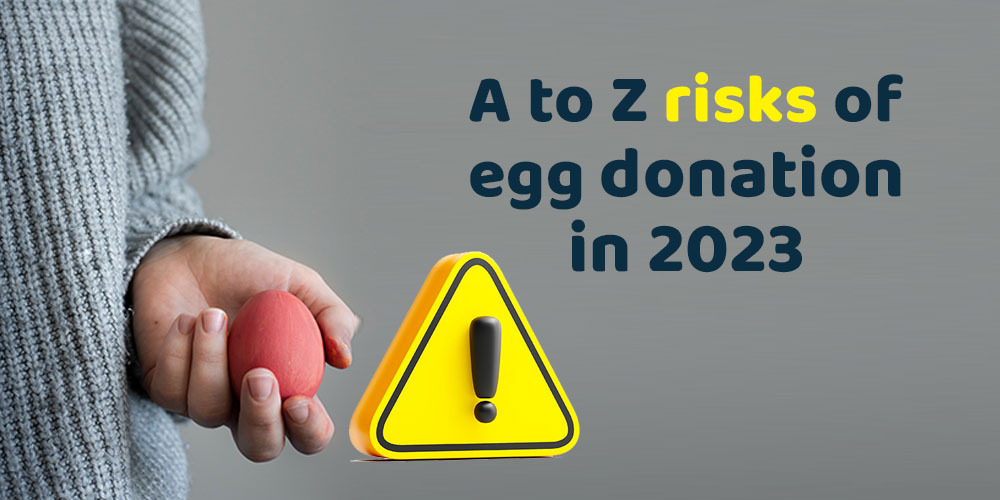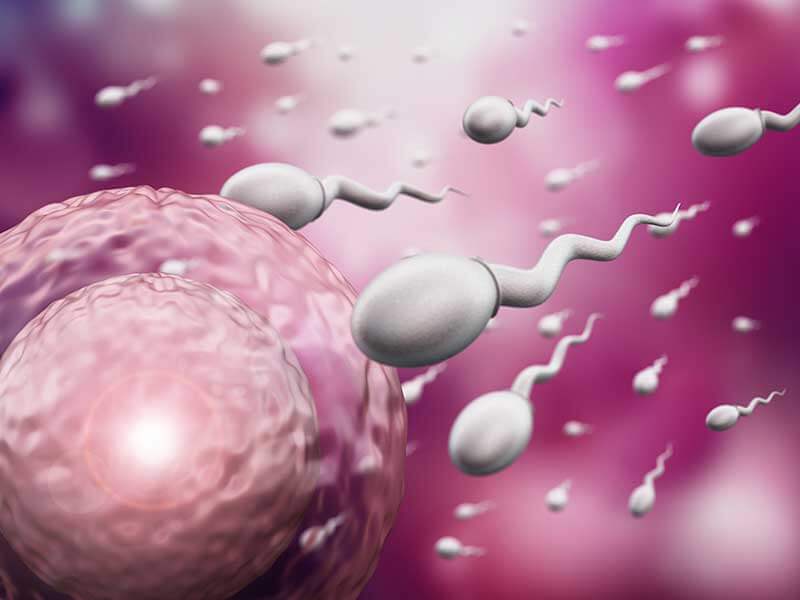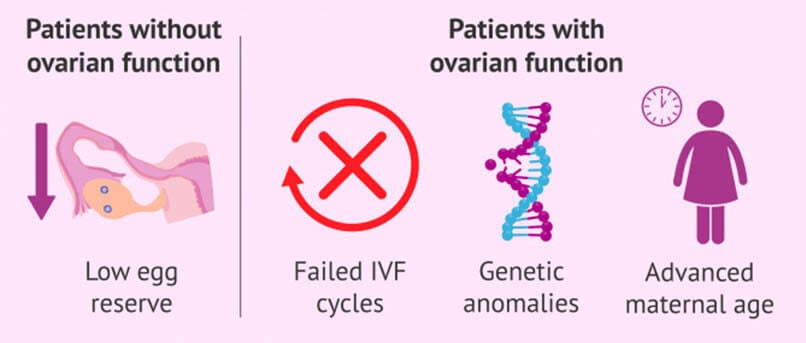
The egg donor has a very important role in the IVF cycle. The follicle stimulation involves taking certain medications and recommendations to have a successful implantation. Egg donors are required to undergo the procedure with full commitment and do extensive screening tests before going through the donation process which includes a series of blood tests to evaluate the body’s hormonal levels and receive the proper treatment plan based on the reports.

Egg donation is a safe procedure in general and if it was not so, this technology would not be allowed at all. However, just like any other medical procedure, egg donation might have some short-term risks for egg donors. Being aware of these complications in advance can help donors be aware of the egg donation pains before they decide to donate.
Pregnancy is one of the egg donation risks! In an egg donation cycle, you stop using birth control pills and because of using hormonal medications, you will be producing multiple eggs instead of one. During this time, if you have unprotected sex, your chance of becoming pregnant is higher than normal. You should refrain from intercourse at this time or you should have effective contraception.
Since you are taking medications, there will be more than one mature egg that could lead you to get pregnant with multifetal pregnancy! Because multiple eggs are often fertilized during IVF, there is a higher chance of having twins, triplets, or other multiples. These pregnancies can have a higher risk of complications, such as preterm labor and low birth weight.
Gaining weight is another side effect of egg donation because donors can put on weight on average of 3-5 pounds. You should know that this is a temporary side effect and after the donation cycle is completed and you got your first period, this issue will be resolved.
Mild Bloating and cramping can happen due to the effects of fertility injections. Premenstrual syndrome (PMS) symptoms like hot flashes, fatigue, mood swings, breast tenderness, vaginal dryness, headache, etc. are among other side effects of prescribed medications for egg donors.
If the symptoms are severe, it can lead to exaggerated ovarian swelling and fluid accumulation in the abdomen which is known as ovarian hyperstimulation syndrome (OHSS). The severe symptoms are rare and it might happen in %5 of donors; nevertheless, they are serious and could need hospitalization. OHSS may lead to complications like blood clots, kidney failure, fluid build-up in the lungs, and shock. So in case of severe symptoms, you should call your doctor immediately.
The other egg donation consequences for donors are bleeding, and damage to nearby organs like the bowel, bladder, or blood vessels. Infection can occur if bacteria enter the uterus or fallopian tubes during the procedure. One of the most important worries of donors is losing their egg supplies and not being able to have a child in the future. The anti-mullerian hormone level (AMH) is a marker of the number of remaining eggs in the ovary. As the result of recent research shows, the AMH level of donors who had experienced multiple donations is not decreased which shows their fertility ability was not affected by the donation cycle.

In the egg donation process, there is a very small risk of passing on genetic disorders to the child. While egg donors are screened for genetic and other medical conditions, it is possible for a disorder to be missed.
It is also important to note that there may be emotional and psychological risks associated with egg donation. The child may have questions about their genetic heritage and may struggle with identity issues. The egg donor may also experience feelings of loss or regret after the donation, especially if they have a close relationship with the child. Additionally, it is also important to consider the legal and financial implications of egg donation, as laws and regulations vary from country to country and from state to state.
It is important for the intended parents and the egg donor to have open and honest communication throughout the process, and for all parties to have access to counseling and support. It is also necessary to have a clear understanding of the legal and financial agreements before proceeding with the egg donation.
Furthermore, it is recommended that parents be open and honest with the child about their conception and the use of egg donation. This can help the child understand their genetic heritage and may also help alleviate any potential identity issues.
In general, while egg donation can be a successful way for individuals or couples to have a child, it is important to carefully consider the potential risks and benefits before making a decision. If you have open and honest communication and counseling with your donor or your agency throughout the process, you can have a satisfying egg donation experience that meets your desires.

Egg donation is generally a very safe procedure and does not have long-term risks or at least the long-term risks of egg donation are not well understood as egg donation is a relatively new field and long-term studies are limited. Candidates are fully screened and evaluated before the process. If the fertility specialist feels that the candidate is at the risk for a long-term problem, they do not allow the egg donation process to happen. However, some potential risks to consider include:
1. Ovarian Reserve: Egg donation may affect a woman's ovarian reserve, which is the number of eggs remaining in the ovaries. This could potentially impact a woman's ability to conceive naturally in the future.
2. Emotional and Psychological Risks: Egg donation can be an emotionally and psychologically complex process, and some women may experience feelings of loss or regret after the donation. Both the egg donor and the intended parents should have access to counseling and support.
3. Legal and Financial Implications: Laws and regulations regarding egg donation vary from country to country and from state to state. It is important to have a clear understanding of the legal and financial agreements before proceeding with the egg donation.
4. Medical Risks: There is a small risk of ovarian hyperstimulation syndrome (OHSS) and infection during the egg retrieval process. Additionally, there is a very small risk of passing on genetic disorders to the child.
5. Risk of Multiple Pregnancies: There is a risk of multiple pregnancies as a result of in-vitro fertilization, which can have a higher risk of complications, such as preterm labor and low birth weight.
6. Risk of Ovarian Cancer: Some studies have suggested a possible link between ovarian stimulation and a slightly increased risk of ovarian cancer. However, the risk of ovarian cancer is very low and the majority of studies have not found a significant increase in risk.
It is important for women considering egg donation to discuss any concerns with their fertility specialist and OB/GYN and to be aware of the potential egg donation risks. Additionally, both the intended parents and the egg donor should be aware of the legal and financial implications and should have access to counseling and support. It is wise to consider all the risks and benefits before making a decision about egg donation.
TebMedTourism counselors will evaluate your medical records and guide you to make the best decision about your treatment plan. The safety and health of the donors are definitely the priority and our physicians try to minimize the egg donation risks by adjusting the medications and the IVF protocols. To get more information about the egg donation procedure in Iran and to consult with our doctors, you can contact us free of charge 24/7.
Learn more:All about Egg donation in Iran
Egg Donation risks are often short-term and they disappear after stopping taking medications. The egg donation process has two main stages that may include some risks:
Both steps are safe and often without serious danger to the egg donor. It can be said that the most important danger of egg donation is ovarian hyperstimulation syndrome (OHSS). This is a condition that occurs when the ovaries become swollen and painful after being stimulated to produce multiple eggs. Symptoms can range from mild to severe and can include nausea, vomiting, and difficulty breathing.
This syndrome can occur due to the use of hormonal medications that are aiming to increase the number of egg follicles. By taking hormonal injections, more than one follicle will be matured in one cycle.
These medications may cause the ovaries to grow more than the normal condition and be filled with fluid. Usually 24 hours before the egg retrieval process, the human chorionic hormone hCG will be administered to maximize the thickness of the uterine lining in order to make it suitable for pregnancy and stop menstruation. Studies show that hCG is the cause of OHSS in some patients.
Egg donation cancer risk is not scientifically proven and there is currently no evidence to suggest that egg donation directly causes cancer or noticeably increases the risk of ovarian, endometrial, cervical cancer, or breast cancer in women. The donors will be screened before egg donation which determines their health and if there be high risks involved, egg donation will not be recommended. The egg donors’ safety is the priority of TebMedTourism’s fertility specialists and you should be completely aware of the procedure and egg donation risks before donating.
There is a myth that repeated egg donation may cause donors to get cancer, but there is no proof for that and no medical authority has declared it. A number of donors have donated not only once, but multiple times and there is no cancer record in their medical report. Even though some of the egg donors may face cancer coincidentally, there is no connection between their donation and this disease.
It is important to note that the risk of ovarian cancer is very low, and the majority of studies have not found a significant increase in risk. However, some studies have suggested that women who have undergone ovarian stimulation may have a slightly higher risk of developing ovarian cancer compared to women who have not. In fact, many factors can contribute to the development of ovarian cancer, and more research is needed to understand the possible link between ovarian stimulation and cancer risk.
Women considering egg donation can discuss any concerns about cancer risk with their fertility specialist and consult with their OB/GYN for regular checkups. Additionally, women with a personal or family history of ovarian cancer may be at a higher risk of ovarian cancer and may need to take additional precautions.
In conclusion, while there is currently no evidence to suggest that egg donation directly causes cancer, it is important to be aware of the potential risk of ovarian cancer associated with ovarian stimulation. However, the risk is very low and more research is needed to understand the possible link.

Communication ways:
Call us: +98 912 098 5010
Visit us: No.2, First 8 meter alley, Nobovvat sq., Tehran, Iran
Mail us: [email protected]

Comments & Questions